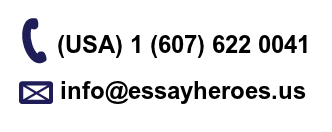NUR 4636: NURSING
he final paper will reflect the student’s course participation and what was learned in the clinical setting, and the teaching project. Reflection papers are meant to summarize your impressions of a course in a few short pages (2 pages). They answer three basic questions: What, Why, and How. Most of the paper is aimed at explaining why what you have learned was important and valuable. Finally, the conclusion demonstrates how the course influenced you, as well as how you are going to use the material in the future.
In this final reflection paper, students are responsible for:
- How were your personal learning objectives accomplished?
- How did the course activities connect with the assignments done throughout the semester? Does it affirm, challenge, illustrate the concepts and strategies of community health nursing?
- What is your personal definition of service learning and your role in the community?
- What is your personal definition of behavioral change? Do you feel the service you provided as a community nurse brings some form of behavioral change and why?
- Please post a photograph/picture along with a summary describing how the photo/picture relates to your clinical experience and learning. Focus on metaphors, feelings, and how the experience reminded you of a prior experience
- This is for a health community class for nursing school. I did volunteer hours as first aid agent in Miami Youth Fair, volunteer in a church taking blood pressure and blood sugar to the community, and also I participated in a woman wellness event.
- Course Description This course focuses on the clinical application of Community Health Nursing Theory. Students will utilize the nursing process in the delivery of healthcare within the community environment. Students will assess the individual, family, and community, develop a plan of care, and deliver care to an individual, family and community within a multicultural environment. Minimum grade of “C” or better required. Co-requisite: NUR 4636. (144 hr. Practicum) Hours to be split evenly between simulation (Sentinel City) and Clinical practice. Course Competencies: Upon completion of the course, the student will be able to:
- 1.Apply historical and theoretical concepts to community health nursing practice by:
- Identifying nurse established community health models in a global society.
- Relating public health concepts to the practice and delivery of healthcare in the community.
- Transferring the theoretical role of the professional nurse to the community setting.
2. Focus on the relationships between theory, evidence-based practice, and education as they relate to community health nursing in a global community by:
- Examining epidemiological concepts as they relate to global health.
- Justifying the nurse’s role as an educator, counselor, advocate and change agent in the community.
- Applying evidence-based principles relating to community health nursing.
3: Transfer theoretical concepts of ethnicity and culture in the provision of nursing care in the community setting by:
- Assessing cultural differences by utilizing existing tools.
- Documenting assessment findings.
- Utilizing assessment findings while providing culturally competent care.
- Evaluating the plan of care for effectiveness in a selected population.
4. Transfer concepts of community assessment, planning, education while promoting health and cultivating empowerment by:
- Negotiating with community leaders to empower selected underserved groups in the community.
- Educating the consumer on using available community resources.
- Assisting the consumer to navigate through the health care system.
5. Evaluate effectiveness, accessibility and quality of personal and population based health care services by:
- Locating existing health promotion programs within a selected community.
- Comparing disease processes and conditions occurring in underserved populations as specified by Healthy People 2030 indicators.
- Examining the effectiveness of existing programs in meeting the Healthy People 2030 initiatives.
Collegewide Student Learning Outcomes: Upon completion of a program of study at the Medical Campus, graduates from Miami Dade College should emulate these outcomes. Participants in the community health practicum will incorporate all 10 of these outcomes in their experiences while in this course.
- Communicate effectively using listening, speaking, reading, and writing skills.
- Use quantitative analytical skills to evaluate and process numerical data.
- Solve problems using critical and creative thinking and scientific reasoning.
- Formulate strategies to locate, evaluate, and apply information.
- Demonstrate knowledge of diverse cultures, including global and historical perspectives.
- Create strategies that can be used to fulfill personal, civic, and social responsibilities.
- Demonstrate knowledge of ethical thinking and its application to issues in society.
- Use computer and emerging technologies effectively.
- Demonstrate an appreciation for aesthetics and creative activities.
- Describe how natural systems function and recognize the impact of humans on the environment.
*We will address learning outcomes #1, #3, #4, #5, #6, #7, #8, and #10 in this course.




